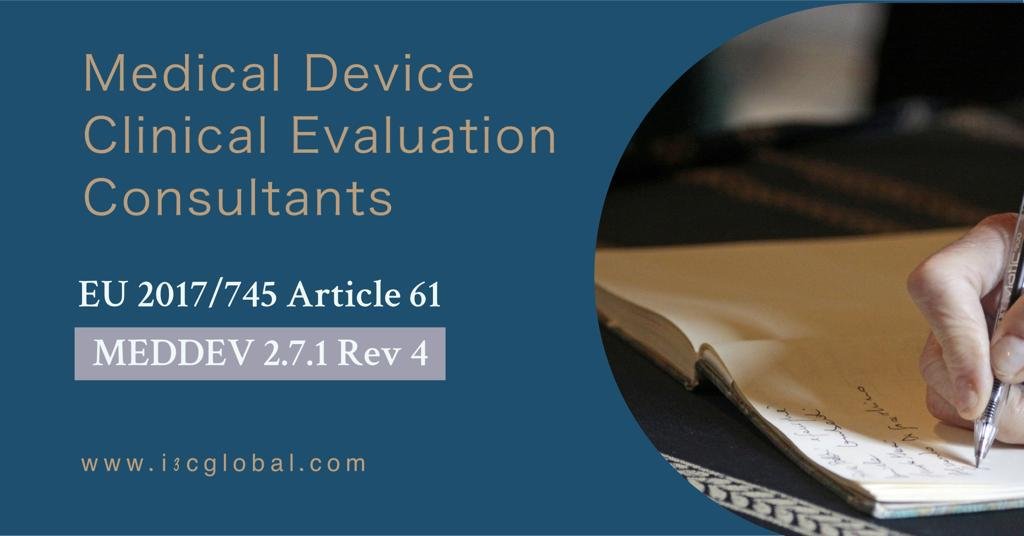Quick Contact

MEDDEV 2.7.1 Rev 4 Clinical Evaluation
The MEDDEV 2.7.1 Rev 4 clinical evaluation guidance offers valuable insights into conducting clinical evaluation report documentation that fulfils notified body requirements and expedites the approval of technical documentation.
Developing a clinical evaluation report in compliance with the EU Medical Device Regulation (MDR) 2017/745, MDCG (Medical Device Coordination Group) guidance documents, and MEDDEV guidance documents is a crucial task for medical device manufacturers pursuing CE Marking in the European Union.
Considering the complexities of the CER documentation requirements outlined in MEDDEV 2.7.1 Rev 4, medical device manufacturers should engage experienced clinical evaluation consultants and writers like I3CGLOBAL. These professionals possess the requisite expertise in the requirements and have a track record of developing CERs for a wide range of device classes and types.
Attempting to manage this process in-house may necessitate employee hiring, training, and ongoing support, all of which entail significant time and financial investments, with no guarantee of success in the end.
Clinical Evaluation in Meddev 2.7.1 Rev.4.
MEDDEV 2.7/1 Rev.4 guides the manufacturers on how to undertake a robust and systematic clinical evaluation and how to demonstrate the scientific validity of the data and conclusions. The important changes and corrections in rev.4 are the below.
- Frequency of updates of the CERs (clause 6.2.3)
- Qualification of the clinical evaluators or authors (clause 6.4)
- Requirement of specific objective for the Clinical Evaluation Consultants / report writer which is to be linked to safety performance and risk-benefit endpoints (section 7 and appendix 5)
- Establishing the State of the Art (clause 8.2)
- Requirement of scientific validity of different type of dataset (sec 8,9,10 & Appendices: 5,6 & 7)
- Detailed information on demonstration of equivalence (appendix 1)
- Information on when a clinical investigation is required (Appendix 2)
- Some detailed information on risk-benefit (appendix 7.2)
- Reinforced PMS and PMCF with the clinical evaluation (throughout the guideline)
- Role and actions required by the notified bodies (appendix 12)
Do you need an email containing full details within 2 minutes?
Frequently Asked Questions About MEDDEV 2.7.1 Rev 4
Why the risk management and clinical evaluation process
Clinical risks and residual risks from risk management should be considered for clinical evaluation to prove the safety and similarly, any new risk or adverse effect obtained in clinical evaluation should be reflected in the risk management considering the design or material change, if required. They are updated regularly to prove the continuing clinical safety and performance of the device or for the need of modification/rejection of device from the market based on the adverse event or new risk observed.
How long does a Notified Body generally take to review the Clinical Evaluation Documents?
Clinical Evaluation Report review is a part of the Technical Documentation (Technical File / Design Dossier). Generally, 2 months if the NB identifies appropriate Clinical Expert.
How Clinical Evaluation is related to IFU/User Manual?
Contraindications and warnings mentioned in IFU or User Manual must be considered while performing the systematic literature search during Clinical Evaluation. In other way around, IFU or user manual must be modified based on the outcomes of the Clinical Evaluation.
Will a Notified Body would ever inform a company that the clinical evaluation is inadequate, and need data from clinical trial?
Yes, the Notified Body will inform if they require a clinical trial in the below situations and also if the data are insufficient to prove the medical device’s safety and performance:
- Where the clinical evidence and clinical data are not relevant and accurate to the device in question
- If the device is new concerning technology.
- If the device is new concerning use, the material of construction and application.
- No similar device is available in the market.
- Multiple recalls on a similar device are reported.
External clinical experts - Who are they? What is there role?
External Clinical Experts are clinical professionals who have expertise in the subject device, chosen and trained by the Notified Body (NB) for the assessment of Clinical Evaluation. They provide advice to the NB concerning the regulations, guidance, common specifications, and harmonized standards.
